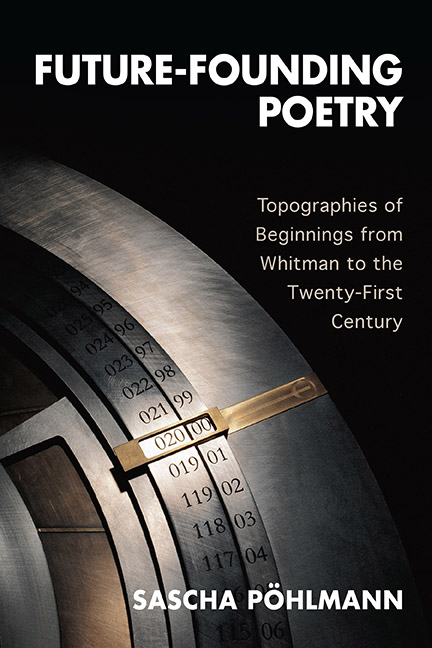Book contents
- Frontmatter
- Contents
- Acknowledgments
- Introduction: On How to Begin, and Where
- 1 Whitman: Beginning American Poetry
- 2 Williams: Beginning Again
- 3 Hughes: Urgent Beginnings
- 4 Rukeyser: Communal Beginnings
- 5 Ginsberg: Defiant Beginnings
- 6 Future-Founding Poetry after 9/11
- Conclusion: On Where to End
- Notes
- Works Cited
- Index
3 - Hughes: Urgent Beginnings
Published online by Cambridge University Press: 25 May 2021
- Frontmatter
- Contents
- Acknowledgments
- Introduction: On How to Begin, and Where
- 1 Whitman: Beginning American Poetry
- 2 Williams: Beginning Again
- 3 Hughes: Urgent Beginnings
- 4 Rukeyser: Communal Beginnings
- 5 Ginsberg: Defiant Beginnings
- 6 Future-Founding Poetry after 9/11
- Conclusion: On Where to End
- Notes
- Works Cited
- Index
Summary
All you who are dreamers, too, Help me make our world anew.
—Langston Hughes, “To You”WILLIAM CARLOS WILLIAMS HAD MADE IT his poetic business in Paterson to find ways of beginning again after Whitman, but the intensity and importance of his project should not give the impression of a seamless chronological progression. After all, while Paterson is certainly a modernist long poem, it was published only between 1946 and 1958, and even though Williams had already written future-founding poetry long before that, his most thorough and remarkable work in that mode came after the heyday of modernism. It is therefore worth inquiring into future-founding modernist poetry again from a different angle in this chapter. However, I will not consider one of the modernist poets I had already mentioned in the context of Williams, but rather a very different modernist who is even more exemplary of future-founding poetry than, say, Pound or Hart Crane, and whose beginnings add yet more highly relevant aspects to the complexities of future-founding as I have already presented them. That poet is Langston Hughes, and in this chapter I want to argue that his poetry—exemplary of the Harlem Renaissance—makes and marks beginnings not in order to maintain potential but rather to create it in the first place, and in a very concrete political sense.
I will show that Hughes, more than Williams or even Whitman, uses an imagination of the future to directly affect the present, and that the beginnings in his poetry attain a sense of urgency and necessity that makes future-founding not so much a cultivation of potential but rather a political matter of life and death. The central term in his future-founding poetry is “the dream,” a motif Hughes uses “more than any other poet of his or any other generation” (Ojo-Ade, “Africa and America” 13), and “a concept which was to become a strategic theme, a major artery running through the body of his work” (Jemie, “Black Esthetic” 105). I will concentrate on his variations of that concept in my analysis, at the cost of excluding many other poems that would also qualify as future-founding.
- Type
- Chapter
- Information
- Future-Founding PoetryTopographies of Beginnings from Whitman to the Twenty-First Century, pp. 157 - 202Publisher: Boydell & BrewerPrint publication year: 2015

